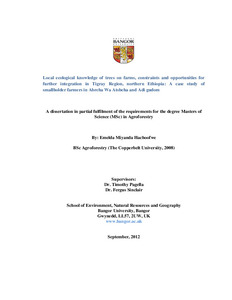Local ecological knowledge of trees on farms, constraints and opportunities for further integration in Tigray Region, northern Ethiopia: A case study of smallholder farmers in Abreha Wa Atsbeha and Adi gudom
Abstract
Farmers have been managing agriculture systems for centuries, and trees often play a significant role within these systems. Understanding the local ecological knowledge (LEK) and perceptions of smallholder farmers about integration of trees on farms is essential to the identification of the drivers and understanding the barriers to integrating trees on farm however most times these is not taken into account during planning and research. In this study a model approach was adopted with two contrasting sites one with high adoption levels and the other with low levels of adoption. The main factors that distinguished the two sites are that in Abreha wa atsebha (Site A) practices such as free grazing are no longer being practiced and zero grazing has been adopted. However on the other hand in Adi gudom (Site B) free grazing is a practice that the community is struggling with and farmers are not very receptive to the idea of tree planting due to the said problem. Most of the trees that farmers would prefer to plant on farm are available in the community nursery in abreha wa atsbeha which is not exactly the same for Adi gudom .Furthermore the trees they have planted are exotic and farmers have little knowledge on how to manage them and the benefits they provide. Bridging these gaps in knowledge presents an opportunity for enhancing adoption. The main drivers to tree planting common to both sites identified by farmers included income generation, ownership, government policy and direct benefits from trees. On the other hand barriers included farm size, negative interaction, water scarcity, obstruction during ploughing and incapability to fence tree seedlings. In site A agroforestry interventions have been responsible for improvements in food security and in site B with low tree cover there is an opportunity for transfer of knowledge for targeted interventions.

